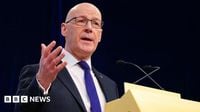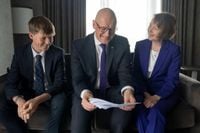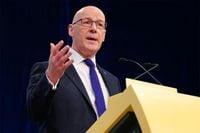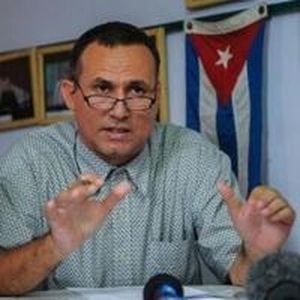On October 13, 2025, the Scottish National Party (SNP) conference in Aberdeen closed with a headline-grabbing announcement from First Minister John Swinney: the Scottish Government will launch a nationwide network of walk-in GP surgeries, a move Swinney described as a “break from the status quo” and a bold new approach to healthcare access. The plan, set to begin with 15 clinics across Scotland, aims to deliver over one million additional GP and nurse appointments, with the first site expected to be operational within the year.
The new walk-in clinics will be open from noon to 8pm, seven days a week, and crucially, patients will not need to book appointments—an attempt to end what Swinney called the “8am rush” for GP slots that has long frustrated patients and overburdened surgeries. According to BBC News, Swinney told delegates, “They will break from the status quo. They will add to the care we already value. Staffed by GPs and nurses. And you won’t need to call up for an appointment. That means more people can go after work—when it fits with their lives.”
The First Minister’s speech, described by one attendee as “a John special,” was met with enthusiasm from SNP delegates, drawing seven standing ovations and praise for its “inspiring and awesome” tone. Yet, as STV News noted, Swinney did not shy away from acknowledging the “challenges” facing the NHS in Scotland, including persistent workforce shortages and rising patient demand. He stated, “There is no more important issue to all of us than our National Health Service. More and more people are being seen, waiting lists are falling, more appointments, more operations, and more GPs, but one key issue I hear about is the ‘8am rush’ for appointments. We want to make it easier for you to see a GP where and when it works for you.”
In addition to the healthcare pledge, Swinney announced a government-sponsored scheme to bring skilled social care workers from overseas to address critical staffing shortages in Scotland’s care homes. This initiative, expected to cost around £600,000, comes in response to the UK government’s closure of visa routes for social care workers—a move Swinney lambasted as “prejudice” from Westminster. “We will sponsor these skilled staff so they can work, pay tax and help keep Scotland’s care homes running. Hundreds of dedicated workers, able to start work immediately. Scotland’s older people must not pay the price for Westminster’s prejudice,” Swinney declared, as reported by The Herald.
The First Minister’s address was also laced with sharp criticism of both the UK Labour and Conservative parties, as well as the broader Westminster system. Swinney accused Prime Minister Keir Starmer of abandoning progressive principles, stating, “Keir Starmer promised to be a left-wing Labour leader. And then he became a right-wing prime minister. He stole Jeremy Corbyn’s clothes and now he’s dressing up as Nigel Farage. He hasn’t even tried to implement the progressive policies that people backed him for.” Swinney argued that Labour and the Tories were “locked in a race to the right,” and positioned Scottish independence as the only way to break free from what he called “decades of failed Thatcherite economics.”
For Swinney and the SNP, the walk-in GP initiative is part of a broader campaign to demonstrate the benefits of self-government and to reinforce the party’s case for Scottish independence. “That is personalised care, on your doorstep. That is self-government working. That’s the SNP Government working for Scotland,” Swinney said, according to STV News. He further described independence as a path to a “modern, outward-looking, inclusive compassionate country. Not a devolved nation but the world’s newest independent nation.”
The conference also saw SNP members endorse Swinney’s strategy for a second independence referendum: if the party wins a majority of seats in the next Holyrood election, it will claim a mandate to pursue another vote on Scotland’s constitutional future. This approach, Swinney argued, is the “most realistic way” forward, referencing the precedent set by the 2014 referendum, in which Scotland voted 55.3% to 44.7% to remain in the UK. However, Starmer has maintained that he “could not imagine indyref 2 taking place during his time in office.”
Despite the positive reception from SNP delegates, Swinney’s proposals were met with skepticism and criticism from opposition parties and some professional groups. Scottish Labour’s health spokeswoman, Dame Jackie Baillie, dismissed the walk-in GP plan as “just another example of government by press release, with another sticking plaster promise to try and fix the mess while the crisis at the heart of the system goes ignored.” She added, “After 18 years in power, if John Swinney and the SNP had the ideas to fix Scotland’s NHS, they would have done it by now.”
Scottish Liberal Democrat leader Alex Cole-Hamilton was similarly critical, arguing, “The SNP have been in power for 18 years and on their watch there are not enough GPs. In fact, they have hired less than one in 10 of the GPs they promised in 2017. John Swinney didn’t fund a fix when he was finance secretary for years. No one believes he will do it now as first minister.”
Scottish Conservative leader Russell Findlay described the plan as “half-baked” and accused Swinney of delivering “recycled rhetoric.” He asserted, “He appears to have forgotten that he’s been at the heart of this useless SNP government which has left a trail of broken promises for almost two decades. His latest rallying cry to break up the country will excite diehard nationalists but everyone else is urging him to ‘move on, John’.”
Concerns were also raised by Dr Chris Provan, chair of the Royal College of GPs in Scotland, who warned that the proposal “does not address the major barriers to good access: critical workforce shortages and unmanageable workload.” Dr Provan noted, “While there has been a modest increase in whole-time equivalent GPs over the past year, Scotland still has fewer GPs today than it did a decade ago. This is the fundamental problem. GPs will have serious concerns about the delivery and impact of this proposal, and we will await clarity on the implementation detail.”
Amid the political wrangling, many ordinary SNP members left the conference buoyed by Swinney’s promises. One activist from Dundee said, “Things are much better than they were in 2023. It’s much more upbeat. I’m not saying it’s at 2014 levels but it’s good.” Another delegate described the GP hubs as “absolutely amazing,” expressing hope that the initiative would silence critics.
While the First Minister’s speech was long on vision and ambition, questions remain about the practicalities—such as funding, staffing, and the precise locations of the new clinics. As Swinney himself acknowledged, “This is just the start. We will expand this network, but it will begin with fifteen sites across Scotland.” For many, the coming months will reveal whether these bold promises can be translated into meaningful change for patients and care providers alike.
For now, Scotland’s healthcare debate has been thrown into sharp relief, with the SNP betting that innovation and a renewed push for independence will resonate with voters facing daily struggles to access care.






